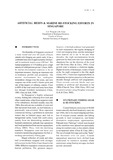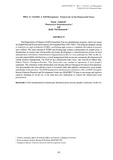“Strategies for Trawl Fisheries Bycatch Management” GCP/RAS/269/GFF REBYC-II CTI INDONESIA Technical Meeting on Data Collection & Evaluation of Fishing Effort for Fisheries Management (Based on the Guidelines developed for Total Allowable Effort Calculation) Denpasar, Bali 27 – 30 September 2016
Description
The Project – Strategies for trawl fisheries bycatch management (REBYC-II CTI; GCP/RAS/269/GFF) – is contributing to the more sustainable use of fisheries resources and healthier marine ecosystems in the Coral Triangle and Southeast Asia waters by reducing bycatch and fishing impact by trawl fisheries. The Project is structured around four interrelated components:
a. The Policy, legal and institutional frameworks component
b. The Resource management and fishing operations component
c. The Information management and communication component
d. The Awareness and knowledge component
Citation
Technical Meeting on Data Collection & Evaluation of Fishing Effort for Fisheries Management in Strategies for Trawl Fisheries Bycatch Management”.(2016). Indonesia
Subject
Collections
- Country Activities [95]
Related items
Showing items related by title, author, creator and subject.
-
Guideline For Fishing Effort Management (Total Allowable Effort) In Trawl Fishery Management In Aru and Arafura Sea
Umi Muawanah, PhD. (SEAFDEC, 2016)Trawl fishery in Indonesia is considered to have negative impact on the fisheries resources and it is also considered to be destructive to the marine ecosystems and impact negatively on the biodiversity, threatening ... -
Artificial Reefs and Marine Re-stocking Efforts in Singapore
Wong, L. S.; Chou, L. M. (Training Department, Southeast Asian Fisheries Development Center, 2004)Coastal resources management initiatives in Singapore are presented in the paper. The use of artificial reefs and the marine stock enhancement activities of the country are given emphasis. -
Effort to Establish a Self-management Framework in the Demarcated Zones
Auimrod, Sayan; Suanrattanachai, Phattareeya; Petchkamnerd, Jinda (Training Department, Southeast Asian Fisheries Development Center, 2003)The Department of Fisheries (DOF) formulated Thai sea rehabilitation program, which was under the Eighth National Social and Economic Development Plan (1997-2001). This program adopted concept of territorial use right in ...




